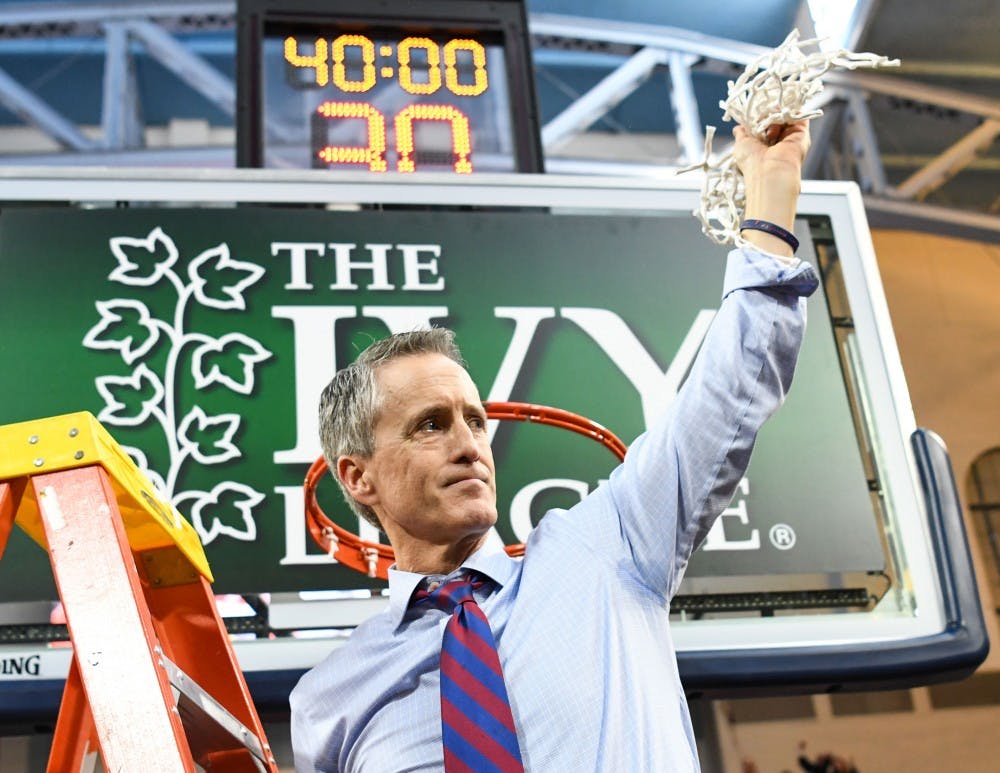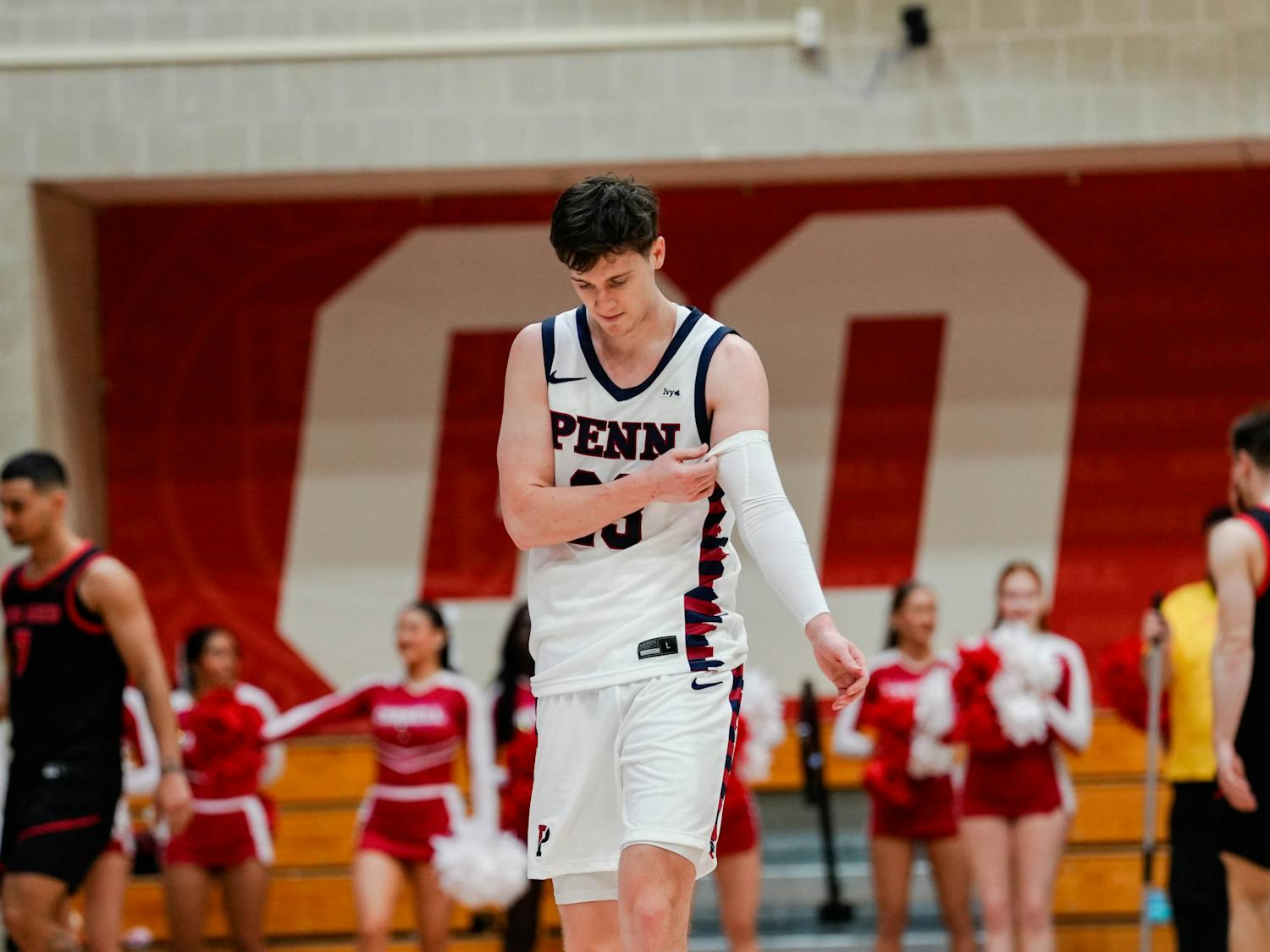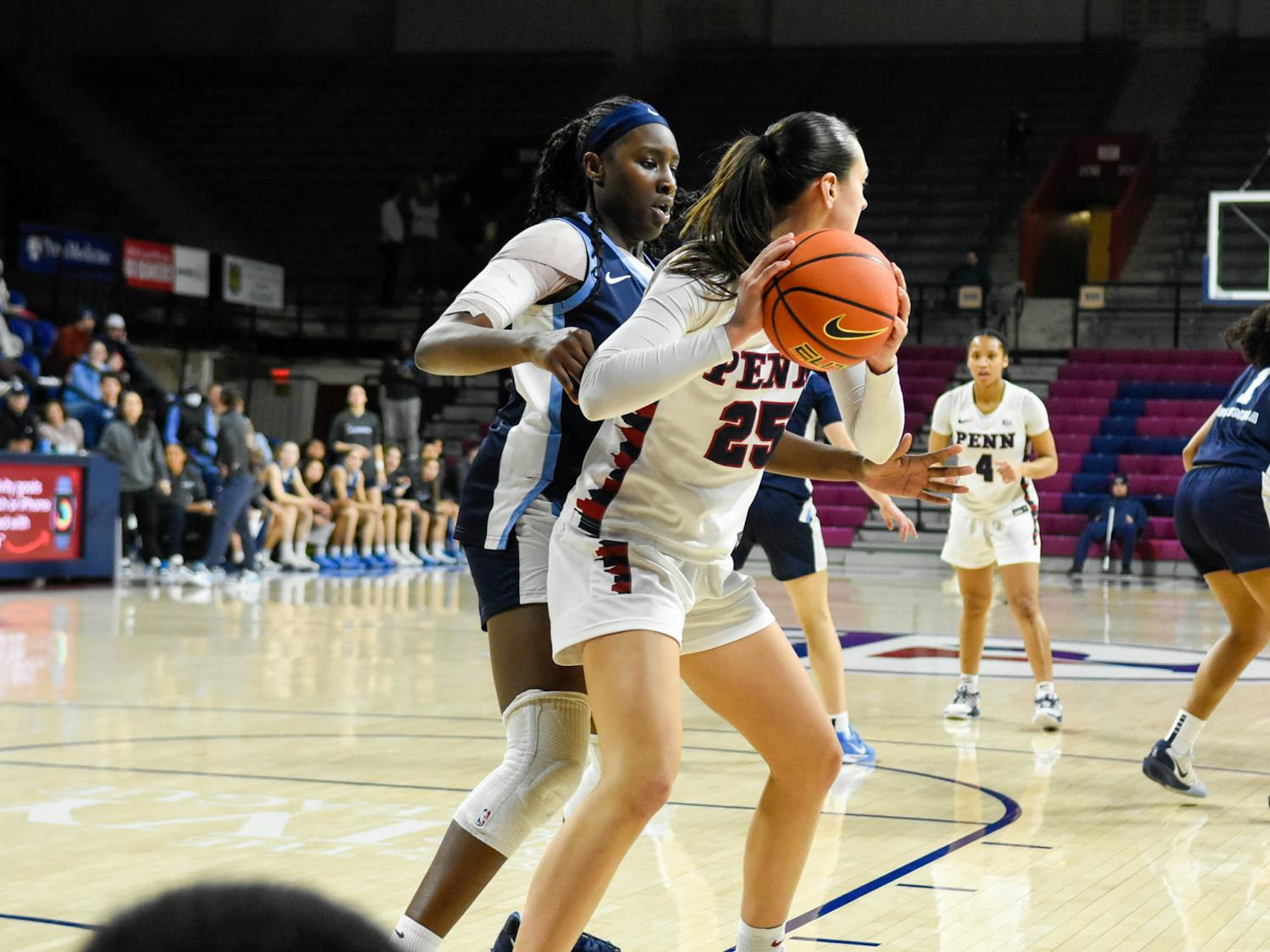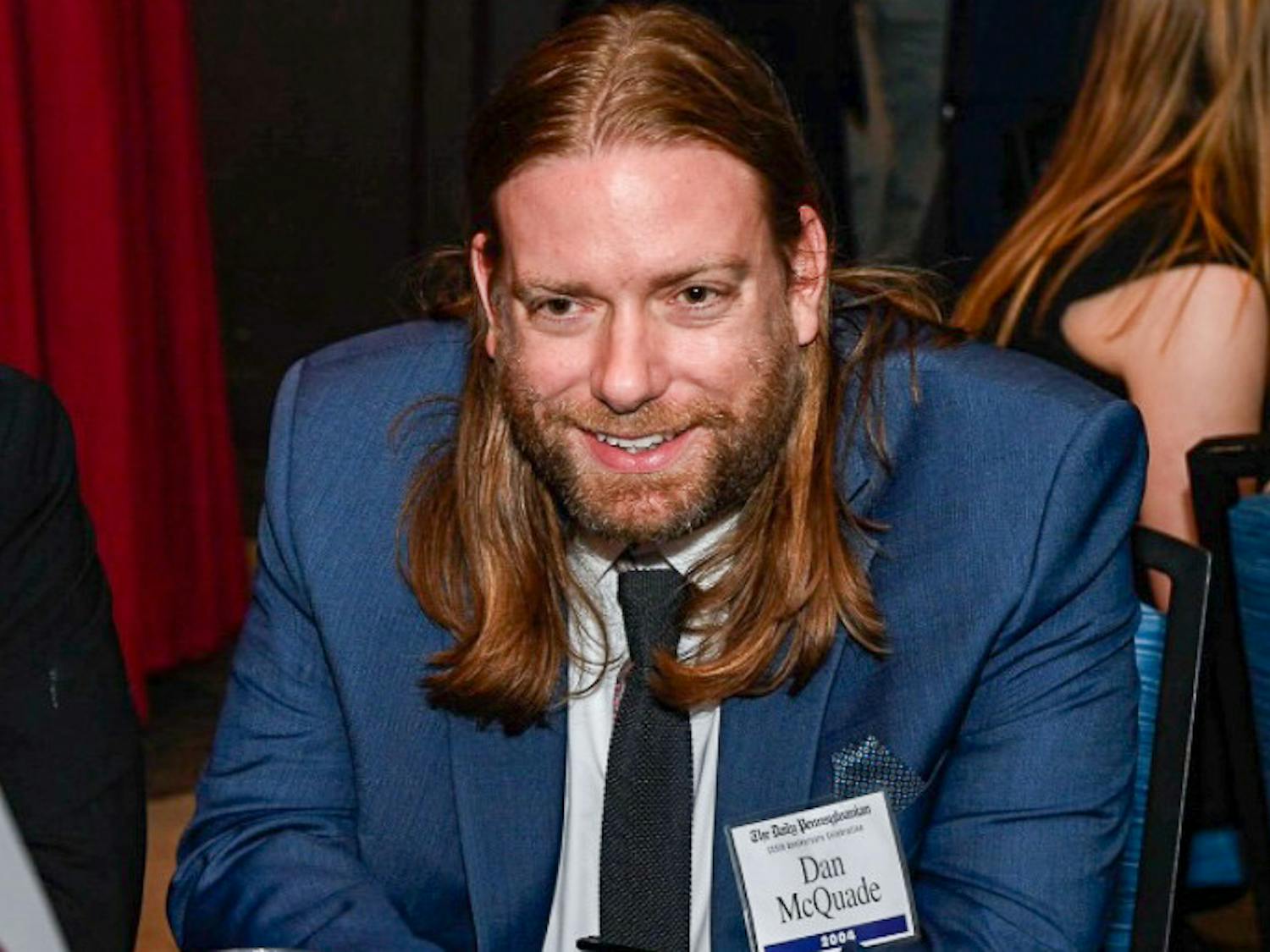February 7, 2017. Penn vs. Princeton.
The first three years of the Donahue era revolve around just one game.
At the final buzzer, Penn men’s basketball sulked off its home court, a dismal 0-6 in Ivy League play. Losing in a deflated Palestra to its archrivals — and barely putting up a fight, at that — was only the latest in a series of dismal moments that spanned the Quakers’ second season under their new coach.
Critics declared their season dead that night — something the Quakers would later mock by calling themselves "zombies." But in that moment, you couldn’t blame the critics for drawing such a conclusion.
47 games into coach Steve Donahue’s tenure at the helm of the Red and Blue, their record stood at a disappointing 18-29. Penn’s 64-49 loss to Princeton was its seventh defeat in eight games, and the team looked well on its way to another season in the bottom half of the conference. Following a four-year stint at Boston College that Donahue himself called a “failure,” doubts were growing whether Dr. M. Grace Calhoun had picked the right man to replace Jerome Allen as head coach.
42 games since Feb. 7, 2017, those doubts feel more than misplaced — they seem ridiculous.
30 wins, an Ivy League Tournament Championship, a trip to the NCAA Tournament as the strongest No. 16 seed in NCAA history that gave top-seeded Kansas a real scare, and a 10-point swing in average scoring margin show that Donahue has put his stamp on a program that now looks a bare mirage of its former self.

RELATED:
Basketball Preview Project Page
Quakers strive to embody 'lunch pail mentality' and gain Twitter fame in the process
Here's what you need to know about the other Ivy League men's basketball teams
It took him a while to recruit the right personnel to fit his system as well as get his players to buy in, but heading into his fourth season in charge of the Red and Blue, all signs point towards another run at an Ivy League title and a potential trip to March Madness.
And even more, if Donahue has his way. No longer is he thinking about stabilizing a program left in turmoil after three straight seasons with single-digit win totals under Allen. Now, he’s thinking about something bigger.
“A Student of the Game”
“Very strategic. VERY strategic.”
The words flowed out of Max Rothschild’s mouth without hesitation when prompted to describe Donahue.
“The dude watches more film than most Americans watch TV, or anything,” fellow big man AJ Brodeur added. “He’s the definition of when you call someone a student of the game.”
One thing no one at Penn has questioned of Donahue is his dedication to the game. Players and coaches alike consistently cited his passion and diligence as central characteristics to his success. Though he wasn’t a star when he played college ball at Ursinus in the early 1980s, his passion carried him into the profession of coaching. And whenever his career has hit road bumps, his passion is what kept him going.
“That’s what I respect about him,” Rothschild said.
Donahue seems to eat, sleep, and breathe basketball, per multiple people on the team. Associate head coach Nat Graham said that no one thinks about the game more than Donahue does.
But it’s not just how much he thinks about basketball that makes him special, everyone said. It’s the way he thinks.

“He’s very analytical,” Rothschild said. “He’s an old-school guy with a new-school mentality.”
The new-school mentality Rothschild referenced has exploded into the world of basketball in recent years, though Donahue has long been a proponent of it, teammates said. The key to that “analytical” mentality?
Well, analytics.
“He’s a numbers guy,” Brodeur said. “He is probably one of the most analytically driven people in basketball. We have two shots that we’re trying to get every possession — either lay-ups, or open, catch-and-shoot threes. Anything else, like a long two-pointer or contested threes, are last resorts.”
Donahue has been seen and heard a million times behind the scenes poring over numbers and statistics to crack new codes for his team and unlock players’ potential.
Those analytics have allowed him to construct a high-powered offense at Penn that plays the high-intensity, fast-passing, free-flowing basketball that the Palestra faithful had sorely missed for the better part of a decade.

A high-octane offense and a lockdown defense are the trademarks of Donahue’s best teams over his career.
“I think he’s been very ahead of his time, from an offensive standpoint. You see the evolution of the game a lot more in the NBA right now, in the way that he sees the game. And he was probably ahead of that,” Graham said.
Graham also called the “egalitarianism” of a no-ego, pass-friendly offense a key to success that the Quakers have enjoyed since that fateful Princeton game a year and a half ago.
“Everyone has bought into the system,” said senior Antonio Woods, the only player on the team to have played under Allen before Donahue. “It takes a while to learn, but once you have, it’s just instinct.”
“He Knows What He’s Doing”
It took the Quakers a while to learn, but Donahue’s previous stint in the Ivy League suggested they were always going to.
After working at Penn as an assistant coach in the '90s, Donahue moved to Cornell for his first head coaching job. The program was at a low point in 2000, but by the end of his decade in Ithaca, he had led the Big Red to three straight Ivy League championships and a trip to the Sweet 16 in the 2010 NCAA Tournament.

But six games into the 2017 Ivy League campaign, the situation could not have looked more different from Cornell seven years earlier. The Quakers had lost their way and needed a fresh start.
“Mental toughness — Princeton has it. We’re trying to get it,” Donahue lamented after that fateful defeat. His reaction to that moment has found its way into folklore around the Palestra.
Donahue looked his players in the eyes and told them that they were an 0-6 team. Indeed, they had lost their first six conference games — but he meant more than that. They were playing like losers. Things looked desperate.
So he told them to play with desperation. And when that desperation resulted in a pair of wins, he told them to play with desperation and confidence. That resulted in another three. Back-to-back losses left their fate hanging in the balance on the final day of the season, though: Win at home against Harvard, and the Quakers would complete the fairytale. Lose, and it was all for naught.
The team chose its fate when Jackson Donahue (no relation to Steve) drained a three with just a few seconds left in the game to send the Palestra into pandemonium and Penn into the Ivy League Tournament.

Penn’s subsequent matchup with an undefeated in-conference Princeton resulted in yet another fable — yet one not relevant to this story. One tournament had been reached; the other would have to wait a year.
Between the Princeton loss in February 2017 and the Ivy League Tournament in 2018, Penn went 18-4 in Ivy League play. Two wins in the 2018 Ivy championship and a trip to Kansas for the NCAA Tournament closed the fairytale that will live on the walls of the Palestra forever.
No longer are the Quakers the laughing stock. Now, they’re feared.
“I only won nine games my freshman year, to over 20 last season, so it’s been great to see,” Woods said. “It’s great to see Penn basketball making that turn to the next step.”
“It’s hard to evaluate coaches sometimes,” Graham said, when teams lose games but don’t have the personnel a coach wants for his system. He compared Donahue’s position at the beginning of his tenure to Brett Brown’s at the Philadelphia 76ers at the beginning of "The Process." But by bringing in high-quality recruits and helping them grow, Penn’s own “Process” managed to see Donahue develop yet another championship-caliber squad.
“He’s proven that he’s had great success in this league,” junior guard Ryan Betley said. “He knows what he’s doing. He’s great.”
Ahead of his fourth season at Penn, Donahue appears to have taken full control of the program. Yet that paradoxically doesn’t mean he is in full control — because that’s not how Donahue operates.
"I Want Them To Play Free"

“There’s definitely a lot of coaches that micromanage everything. But he doesn’t do that.”
Graham has worked as an assistant under Donahue for almost 15 year from stints at Penn, Boston College, and Cornell. He even played for Donahue at Penn in the mid-90s when Donahue was an assistant coach for the Quakers.
He described how Donahue takes a somewhat hands-off approach to coaching: Rather than micromanage, Donahue tends to challenge coaching staff and players alike to become their best and contribute to the team in the best ways possible.
Rather than draw up plays and run a regimented system, Donahue prefers to teach his players how to think quick and react on the fly, whether it be to a change made by the other team, a change in the flow of the game, or a new matchup. The results of this strategy often see the type of free-flowing basketball that Graham and Donahue both love to play.
“I want them to play free,” Donahue said. “I want them to play with fun and joy.”
Off the court, the coaching style remains. Donahue leaves most of the individual man-management to his assistant coaches, especially given his trust in Graham, a longtime loyalist.
But if he needs to intervene, he never hesitates.

“He knows exactly when we need to be put in line,” Betley said. “There’s no goofing around in film, but he has a sense of humor like everyone else. He understands that we’re college kids, and we like to have fun, but when you’re in between the lines, it’s all business.”
That all-business mentality was echoed by a number of fellow players. In a number of ways, they said he stays above the fray so that he can keep his mind on the important decisions that keep the team ticking.
“It’s more of a business to him. He doesn’t take the fun out of it, but it is very business-minded,” Rothschild added.
After all, executives like Donahue have a number of key choices to make — like who gets play time, how they practice, and how they play, for starters.
But that’s not to say he doesn’t understand that his players are college students, and should be treated as such. Consistently, his players said they felt well-treated by their coaching staff and empowered to make the team their own.

“This Is Your Team”
Whether it’s a function of Donahue, or a function of coaching in the Ivy League, where student-athletes tend to come to college more mature than in the power conferences, the fact stands that Donahue plays a surprisingly backseat role in team-building.
Graham recognized this notion and expressed relief at how easy it is to work with bright student-athletes at Penn.
“We just don’t have bad guys. For us [coaches], it’s not like we’re having to walk around and make sure they go to class. You get to sit down and have conversations and enjoy them as people, who go from 18 year-old kids and walk out of here as young men.”
Helping to shape young men was a theme Graham harped on as one of the key jobs of all the coaches, including Donahue. That sentiment was something some players expressly appreciated.
Matt MacDonald, a captain of the last two years’ teams, praised Donahue for stressing how he wanted the players first and foremost to develop lifelong memories and a strong culture that made them better men. Ultimately, they could then build their legacy on the floor of the Palestra.

“He basically almost removed himself — it was our team, made from our players,” MacDonald said. “He really emphasized it being our team. He would always say that at the beginning of the year, like, ‘This is not my team or the coaches’ team; this is your team. You’re running the show.’ That’s pretty rare, especially at the college level.”
But for Donahue, that’s standard practice.
Penn’s coach has consistently shied from the limelight during his team’s recent success — and he bore the brunt of the blame during its early failures. Most of the quotes and anecdotes for this story come from other people, primarily because of how hesitant Donahue is to talk about himself when credit could be given to his players.
“I would rather focus on our program,” he said.
“He’s not someone that spends any effort with his personal public relations,” Graham noted. “So I think coaches’ opinions are higher than what maybe general opinion is of him.”
Instead, he’s all business. And on the eve of his fourth season at the helm of the Red and Blue, his mind is focused on much more than a simple narrative of his first three.

Year Four
The Quakers have just come off their best season in recent memory. But the time for celebration is over, Donahue said. It’s time to look ahead at the next campaign.
“When we first got here, coach Donahue emphasized the fact that we’re not here to defend a championship. We already won — there’s no need to defend it,” Brodeur said. “He just keeps emphasizing that we need to play every game that desperate and with that sense of urgency, like every game could be our last. We’re hungry. We want to chase another championship.”
“I want us to have that 0-6 mentality,” Donahue added. “But we need to have confidence at the same time.”
If they can keep that mentality that drove them through the last season and a half, then fans should look forward to seeing them playing in the postseason. But Donahue thinks that postseason basketball alone isn’t ambitious enough.
“We can compete at the top level nationally,” he said. “We should be thinking Sweet 16s, Elite Eights, Final Fours. There’s no reason why not.”
Given the example of Loyola-Chicago’s Cinderella run last year, he added that Penn could do the same thing come March.
Deep inside Donahue’s head, the numbers and the analytics and the tactics and the vision were all swirling around at fever pitch. An Election Day trip to George Mason to open the fourth year of the Donahue era is just about all he can think about.
The season is here. And Penn men’s basketball has its man on the bench working overdrive.
For more about the upcoming season, check out the project page for the 2018-2019 Penn basketball preview.








